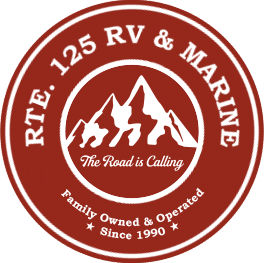Staying Safe on Your Boat
 There’s nothing quite like a relaxing day on the water: cruising around, soaking up the sunshine, enjoying the scenery, maybe dropping a line. Lots of us love boating precisely because it’s peaceful and relaxing. One critical way to keep it fun and relaxing is to keep it safe! A safe day is a fun day. Once you start logging injuries, breakdowns, collisions, lightning strikes, getting lost? Not so much!
There’s nothing quite like a relaxing day on the water: cruising around, soaking up the sunshine, enjoying the scenery, maybe dropping a line. Lots of us love boating precisely because it’s peaceful and relaxing. One critical way to keep it fun and relaxing is to keep it safe! A safe day is a fun day. Once you start logging injuries, breakdowns, collisions, lightning strikes, getting lost? Not so much!
Here’s a quick guide to boat safety from Rte. 125 RV & Marine. This is just a starting point. Please make water and boat safety your constant priority.
We’re here to help, so contact us for all of your boating needs. We’re ten minutes south of Rochester, New Hampshire, on Gonic Road, near the Maine border.
Make a Plan
Always inform someone on shore about where you’re planning to go and when you expect to return. If something goes wrong, they can send out the cavalry. Designate someone as first mate. They must know how to operate your boat, so they can take over if you’re incapacitated. If you’re boating with newbies, initiate a good candidate as first mate. If you’re the newbie, spend as much time as you can with an experienced skipper. It’s the best way to learn.
Watch the Weather
Most boating mishaps originate in a poor decision, often about the weather. Always check the weather forecast, both in advance and right before you depart. Weather can change in an instant and you can’t rely on forecasts 100%. Sometimes storms appear out of nowhere without warning. If you’re surprised by bad weather when you are out, turn back. There’s no shame in racing back to shore when things get ugly!
Bring Safety Equipment
Have a checklist of what to bring, with safety equipment the first priority. Have a PFD (personal floatation device) for each passenger. Kids must wear kid-sized PFDs the whole time. Other must-haves include:
- Life ring.
- Freshly and fully stocked first-aid kit.
- Emergency radio.
- Fire extinguisher.
- Signal flares.
- Fully charged phone.
It’s vital to understand basic water safety. You must know how to deal with falling overboard yourself and assisting someone else if they fall overboard.
Inspect Your Boat
Make a checklist and start every outing with a routine inspection. Check:
- Hull for damage.
- Mechanisms and controls are functioning properly.
- Engine.
- Propeller.
- Oil level.
- Gas level.
Be Alert and Aware
When you’re under power, be on the watch at all times. Avoid debris and shallow areas that may damage your propeller. Watch for swimmers and people doing other watersports and give them plenty of room. Stay to the right when passing other boats. If you have a collision or breakdown, turn off your engine, signal or call for help, and wait for it to arrive.
Use Common Sense
Follow best boat safety practices for yourself, your passengers, and other crafts you encounter. Never operate a boat with impaired judgment, whether by a serious health condition, prescription medication, or alcohol.
You’re ready to cast off! For more info about boat safety, or to check out our inventory of new and used boats, please get in touch with us at Rte. 125 RV & Marine near Massachusetts.
